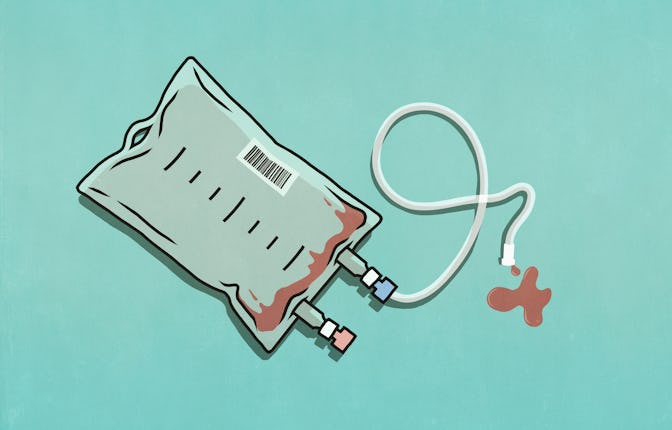Why are we still rejecting blood donations from gay men?
Infectious disease experts offer eye-opening insight on the stigma-fueled, outdated practice.

Health care facilities around the country are facing a blood shortage so intense that it’s requiring doctors to make hard choices about who gets blood transfusions and who does not. The pandemic caused a drop in donations and now things have reached a crisis level. But despite the deep need for more people to donate blood (and plasma, mind you), men who have sex with men (MSM) are still subject to a three month period of celibacy before they donate.
One assumption as to why is that because MSM have a higher rate of HIV infection, that their blood has to be more carefully vetted. But, is that it? It feels like running tests on blood shouldn’t be so challenging that systems such as the Red Cross wouldn’t be able to do so in a timely manner. I asked infectious disease experts to explain why this policy exists.
First, some historical context. In 1983, the F.D.A. imposed a ban on accepting blood donations from gay and bisexual men because of the AIDS epidemic. This policy was widely seen as discriminatory and was challenged in 2010 by a public health policy committee. Unfortunately, the ban was upheld up until fairly recently.
In 2015, the F.D.A. finally lifted the ban, but required men who sleep with men to refrain from sexual contact for three months prior to donating blood. It was progress, but it basically only made a total ban into a partial one. The 2016 Pulse nightclub massacre brought attention to the “gay blood ban,” and activists urged the F.D.A. to end it, to no avail.
Earlier this month, after years of pressure, the F.D.A. began a study to determine the risks of accepting blood from gay men. And just this week, more and more public health experts and politicians have come forward to call out the waiting period as homophobic, unjustified, and unwise. Yesterday, a group of 22 senators urged the F.D.A. to lift the ban, and President Biden agreed with them, calling the discriminatory restrictions “painful.”
So, back to why — besides stigma — these restrictions might exist. The Red Cross thoroughly tests all blood before it’s given to a donor, so rejecting much needed blood donations seems pretty obviously problematic, right?
“There is no practical or necessary reason for all men who have sex with men to be excluded from blood donation,” Sarah Bauerle Bass, an HIV treatment researcher, professor of public health, and director at Temple University’s Risk Communication Laboratory, tells Mic. “It is really a historical holdover from the beginning of the HIV epidemic when the majority of HIV infections were occurring in MSM and there was not rigorous testing in place,” says Bass. In other words, this policy’s homophobic roots are likely the only thing keeping it in place.
In case you’re wondering if there’s some reason for the weirdly specific period of celibacy required — three months — well, that doesn’t appear to be based on current science, either. “The exclusion has persisted because of the argument that HIV has an incubation period,” Bass explains. “It's possible that someone recently infected could donate blood and this would not show up on a screening test right away,” she says, but there are a lot of ways that we can prevent that from happening, like doing individual screenings on people with high risk behaviors instead of excluding a whole category of humans.
This waiting period policy is harmful, says Bass. “It perpetuates a number of stereotypes about MSM and doesn't acknowledge risky behavior of any other person,” Bass tells Mic. Many medical experts agree that risk behavior, and not orientation, is a better way to determine who should give blood. “The fact is that it's specifically discriminatory because we know that heterosexual couples also engage in high risk behavior and they’re not treated the same way as men who have sex with other men,” says Cindy Duke, a Nevada-based virologist.
The cultural stereotype that MSM are just out there poking into random glory holes on the regular (not that there’s anything wrong with that) is hurtful. I know this may be be a real humdinger, but sometimes men who have sex with men are in long-term monogamous relationships. It’s unfair to ask MSM to refrain from sexual contact with partners just because their partners are men. Hopefully, this new research will prove just that.